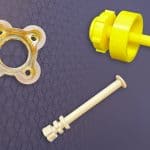An Informational Brief on Polymer Machining
Vespel Polyimide (PI) is a high-performance polymer frequently machined for end-use in aerospace, semiconductor and transportation technology. This material thrives in extreme environments with high strength, chemical resistance, high temperatures, and a low coefficient of friction. It also has impressive sealing and wear properties.
Our latest machining guide discusses what goes into machining Vespel and how its considerations differ from other manufacturing options such as metal machining, injection molding, and 3D printing.
How does AIP approach Vespel and its machining process? To start, we’ll explain the difference between machining PI, a thermoplastic, and machining thermosets.
Machining Thermoplastics vs Thermosets
We’ve already said that Vespel is a thermoplastic, but what does that mean exactly?
All polymers can more or less be divided into two categories: thermoplastics and thermosets. The main difference between them is how they react to heat. Thermoplastics like Vespel, for example, melt in heat, while thermosets remain “set” once they’re formed. Understanding the technical distinction between these types of materials is essential to CNC machining them properly.
What type of thermoplastic is Vespel in particular? PI is a semi-crystalline engineering thermoplastic, meaning its molecular structure is highly ordered.
Properties & Grades of Machined Vespel
Combining heat resistance, lubricity, dimensional stability, chemical resistance and creep resistance, Vespel works well in hostile and extreme environmental conditions. Vespel is able to overcome severe sealing and wear. As we mentioned before, these properties allow Vespel to be commonly machined for semiconductors and transportation applications.
Unlike most plastics, Vespel doesn’t produce significant outgassing, even at high temperatures. This makes it useful for lightweight heat shields and crucible support. Vespel also performs well in vacuum applications and extremely low cryogenic temperatures. However, it does absorb a small amount of water, which results in a longer pump time while placed in a vacuum.
Although there are polymers that surpass individual properties of this polyimide, the combination of these factors is Vespel’s primary advantage.
We regularly machine various grades of Vespel at AIP Precision Machining, including the Vespel SP and Vespel SCP family of products from DuPont. The former group is known for their durability and exceptional thermal resistance, while the latter is known for its mechanical properties and thermal stability.
Machining Vespel
Annealing Vespel
The process of annealing and stress-relieving Vespel reduces the likelihood of surface cracks and internal stresses occurring in the material. Post-machining annealing also helps to reduce stresses that could potentially contribute to premature failure.
Machining Vespel
Vespel offers ease of machining and tight tolerances due to its inherent mechanical strength, stiffness and dimensional stability. Machining Vespel isn’t too different from machining metals as a result of this; pretend you’re machining brass. Unlike metal, though, Vespel (like all thermoplastics) will deform if you hold it too tightly.
We generally recommend Tungsten Carbide Alloy Tooling, although we recommend diamond tooling for large volume runs or work requiring close tolerances. Be wary of overheating Vespel when you machine it. It shouldn’t become so hot that you can’t grasp it with your bare hands.
We also suggest non-aromatic, air-based coolants to achieve optimum surface finishes and close tolerances. Coolants have the additional benefit of extending tool life as well.
Preventing Contamination
Contamination is a serious concern when machining polymer components for technically demanding industries such as aerospace sciences. To ensure the highest level of sanitation down to the sub-molecular level, AIP Precision Machining designs, heat-treats and machines only plastics, with any sub-manufactured metalwork processed outside our facility.
Vespel Machining Guide: Supportive Information
or request a quote here.






